4-MeO-PCP
(4-Methoxyphencyclidine)
TrippyWiki score: 3.4/10
TABLE OF CONTENTS
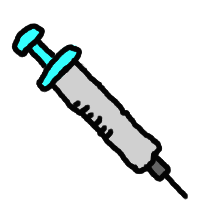
What is 4-MeO-PCP?
4-MeO-PCP (4-Methoxyphencyclidine) is a dissociative substance of the arylcyclohexylamine class. 4-MeO-PCP causes similar effects to those of PCP and 3-MeO-PCP, but the drug is more sedative and less energizing than other PCP analogs. The drug also stays in your system for much longer than other dissociatives.
Long-term benefits & side effects
Many of the benefits will only occur if you take this substance the right way.
Some of the side effects are preventable if you follow the harm reduction practices below.
4-MeO-PCP…
How to take 4-MeO-PCP
Administration
You can either take the substance intramuscularly, intravenously, orally, smoke it, or snort it.
Snorting 4-MeO PCP can be irritating and cause temporary tissue damage. If you are going to snort the drug anyway, use a saline nasal spray to soften the load on your nasal cavities.
Snorting the drug is likely to give you more energy and a clearer headspace.
Those who snort 4-MeO PCP tend to become addicted to it more often and are more likely to redose compulsively.
It is not recommended to take the substance sublingually or rectally. These routes are unpleasant and can also lead to tissue damage.
Injection (either intramuscular or intravenous) is the most common route of administration. If you use this method, the drug will kick in faster.
Make sure your needle is clean and nobody has used it before you, otherwise you’ll be at risk of getting infected. One additional downside of injecting the drug is that you may experience muscle pain.
The drug can also be swallowed. When taken orally, 4-MeO PCP is more dissociative and less stimulating than with other routes.
Interestingly, the higher the dose you take, the less it matters which route of administration you choose as far as the effects of the drug.
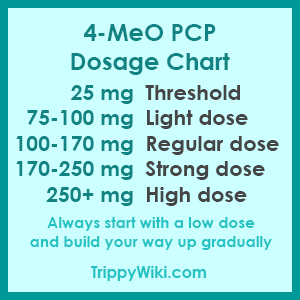
Dosage
High doses are not recommended since they can easily lead to mania and psychosis. Never take such a high dose if you value your mental health.
Never start with a strong dose. You may be more sensitive to the substance than others and it might cause you irreversible damage if you don’t take it responsibly.
Those who need less of the substance to reach desired effects include older and extremely lean people.
Since tolerance to 4-MeO-PCP is developed quickly, you want to wait for at least 1-2 weeks between dosing. Otherwise, you would need a higher dose to reach the desired outcome.
Safety checklist
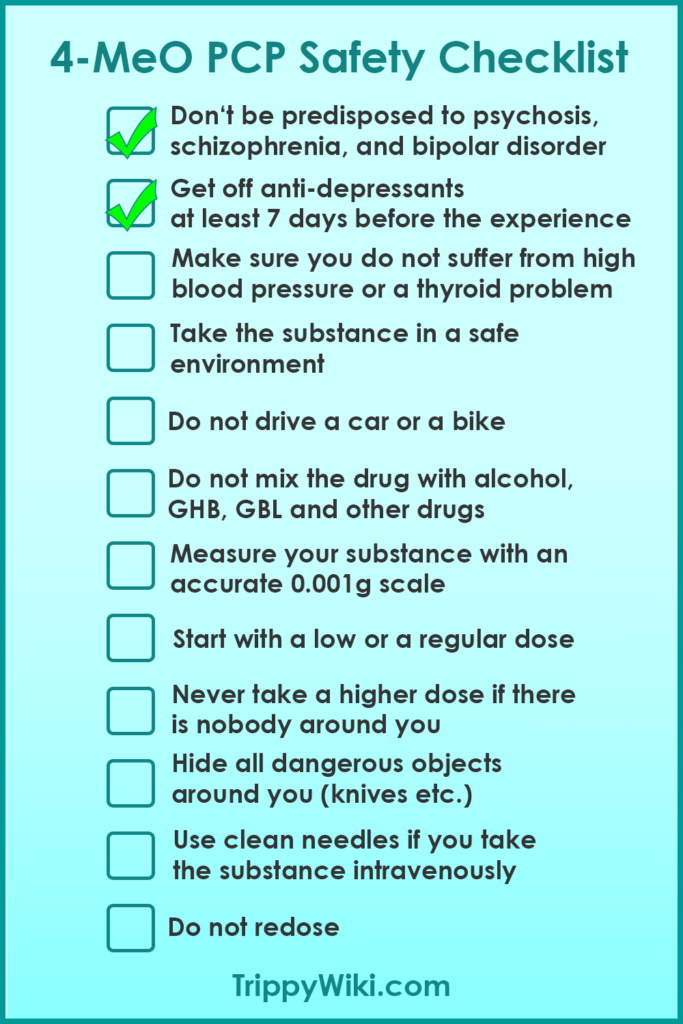
Maximize the benefits
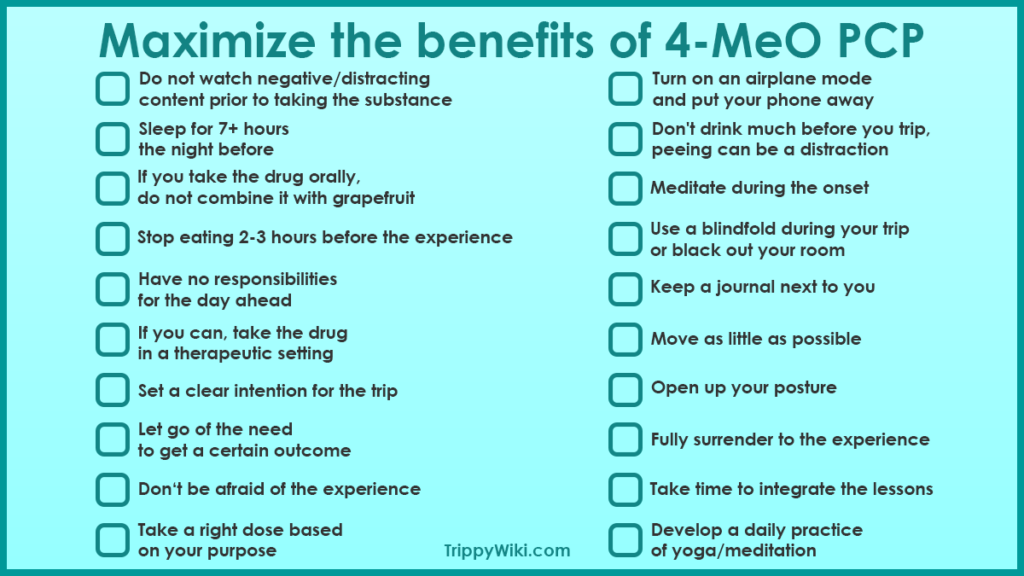
Keep in mind that integration is even more important than the trip itself. Taking the drug would be almost useless if you didn’t retain any lessons in your day-to-day life.
What will help you the most is contemplating about the experience – be it by journaling, thinking about the trip, or sharing your memories with a trusted friend.
Distracting thoughts can get in the way, which is why you want to spend the day after your trip without TV, social media, and other distractions.
If you can, spend time in silence and solitude. Meditate, go for a walk, contemplate the experience.
Duration
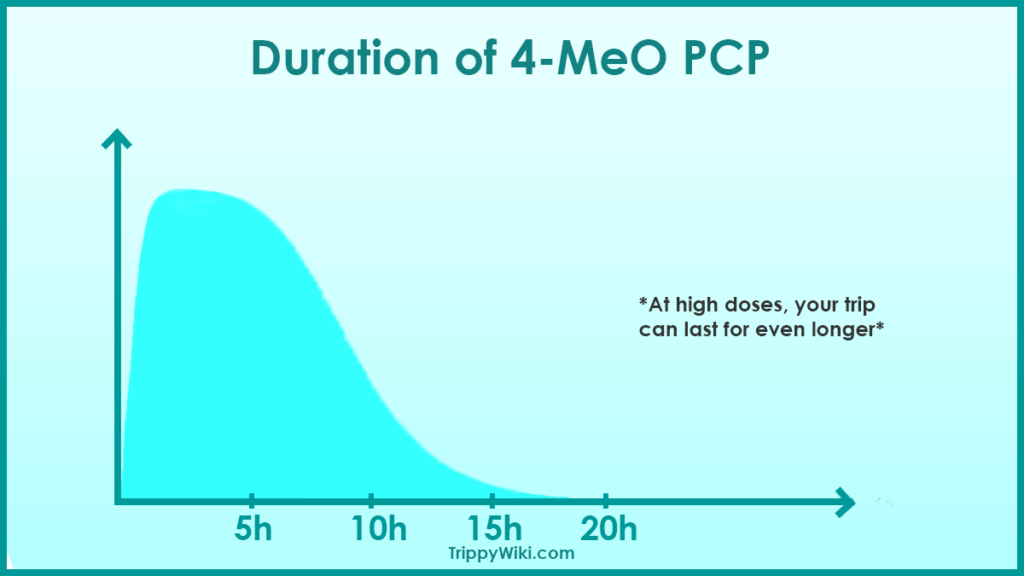
Onset = 45-120 minutes
Come up = 1-2 hours
Peak = 3-7 hours
Come down = 6-10 hours
What does 4-MeO-PCP feel like?
The effects of 4-MeO-PCP are almost identical to those of 3-HO-PCP.
The drug is more sedating, less stimulating, and less psychedelic than 3-MeO-PCP or regular PCP.
Compared to ketamine, DXM, and most other dissociatives, 4-MeO-PCP is still more energizing, euphoric, and less dissociative.
Unlike most dissociatives, 4-MeO-PCP allows you to stay more clear-headed and “functional” at lower doses. You can still go about your day at these doses and perform human activities.
Unfortunately, higher doses can cause psychosis and manic episodes and the chance is higher than with most other drugs. These can last for a long time after you get off the substance.
At high doses, 4-MeO PCP can cause hallucinations that are a lot less predictable than with most psychedelics or dissociatives.
As a dissociative, 4-MeO PCP can detach you from your body, senses, and the environment. You may feel like you’re controlling your body from a distance (similarly to playing a 3rd person video game).
At high doses, you may also enter the K-hole. When that happens, you will not be conscious of your body but with 4-MeO PCP, you may still be able to move around so never take a high dose in an unsafe environment!
Memory loss is a common effect. This can be pleasant because you’ll forget about your struggles, but it can also make you anxious since you may not remember where you are or that you’ve taken 4-MeO PCP.
4-MeO PCP makes some users violent although this is not nearly as common as most people believe. If alcohol doesn’t make you violent, 4-MeO PCP shouldn’t either.
Symptoms of schizophrenia can occur.
You may also think that you are capable of anything when you’re impaired. Beware that this is often a delusion. You may believe that your exercise capacity is enhanced but it is not. People sometimes think that they can drive but they cannot.
Other common short-term effects include:
Euphoria
Increased creativity and open-mindedness
Mindfulness, being present
Introspection
Higher capability for love and compassion
Pain relief
Memory suppression
Anesthetic effects
Numbness
Visual effects (typically weak and unpredictable)
Distortions of size, shape, and distance
Manis
Psychosis
Confusion
Inability to talk
Increased body pressure
Worse thermoregulation
Difficulty urinating
Anxiety, paranoia
Vulnerability
The higher the dose you take, the more intense these effects will be. This especially applies to the dissociative effects.
Your past experiences with drugs also play a big role in the effects of 4-MeO PCP.
With all this said, it is impossible to accurately describe the experience through human language.
Bad trips can happen but you can partially prevent them by following the tips below.
After-effects
4-MeO-PCP rarely causes a withdrawal. If you take the drug on a regular basis, some withdrawal symptoms may occur but they will be mild.
It is, however, common to feel altered for up to 30 hours after you’ve taken 4-MeO PCP, especially when you take a high dose.
You may experience insomnia and find it hard to fall asleep.
Cognitive impairment, numbness, and impaired vision can also stick for over a day after taking the drug. Do not drive if you don’t feel 100% sober!
Many users get a pleasant afterglow when the drug wears off. They feel better and their depression can disappear for a few days, sometimes even weeks.
Bad trips
Bad trips mostly happen because people take the substance irresponsibly. If you take this drug the right way, there is a much lower chance you’ll get a bad trip but it still can happen.
In case you take 4-MeO PCP responsibly and you still get a bad trip, there is a positive side to that.
During a “bad” trip, negative emotions are coming up from your subconscious mind. They have always been there whether you are aware of it or not. They have been damaging your life and a difficult trip is an opportunity to process these traumas and unpleasant feelings and let go of them.
So instead of calling bad trips bad, call them challenging.
Why they happen
The most common reasons for getting a bad trip are:
How to cope with a bad trip
How to end a bad trip
In case you are not ready to face your inner demons yet, there are a few ways to end a bad trip.
One possible way is to put on music that is familiar to you. Another way is to switch up your location and move from one place to another. This can completely change your train of thought.
Interactions
Legality
As of 2021, 4-MeO-PCP is illegal in the UK, the US, and most other countries of the world.
In most European countries, you can order the drug from research chemical companies for “chemical research” purposes. You cannot take the substance legally but whether or not anyone cares is a different story.
In many countries, you can own a small amount of the substance for personal use without getting in legal trouble.
FAQ
You may also like:
Thank you for taking psychedelics responsibly, immature psychonauts are the last thing the psychedelic movement needs.
And thank you for being a part of this renaissance. Together, we can change the world!
